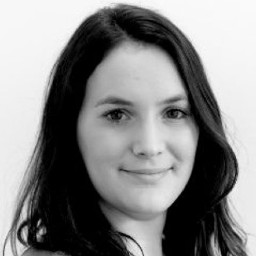Dr Georgia Cook
PhD, CPsychol , PCTHE, MSc, BA
Research Fellow

Role
Dr Georgia Cook is a Research Fellow within the Oxford Institute of Applied Health Research (OxInAHR).
Georgia is a Chartered Psychologist, who undertakes mixed methods research and has over 10 years of research experience.
Teaching and supervision
Courses
Georgia has taught on a wide range of modules at Oxford Brookes. This has included Qualitative Methods in Psychology, Questionnaire Design for Psychology, Foundations of Social Psychology, and Developmental Psychology. Georgia has also delivered teaching and workshops around statistics for Psychology students.
Georgia is a Fellow of the Higher Education Academy, having completed the Postgraduate Certificate in Teaching in Higher Education (PCTHE).
Supervision
Georgia supervises Masters and Doctoral research projects.
She welcomes enquiries from potential PhD students who would like to work within one of her areas of interest.
Research Students
| Name | Thesis title | Completed |
|---|---|---|
| Fiona Tierney | Families’ experience of using sleep-related routines with their young children | 2023 |
Research
Georgia is a Chartered Psychologist who has been involved in conducting predominantly sleep-related research since 2014. Georgia’s research predominantly focuses around exploring, understanding and providing support around sleep problems and disorders, including management and treatment. Her research encompasses a range of populations, including clinical groups and working with children and young people (CYP), their families, adults, clinicians and services. The majority of her research is applied, with an emphasis on improving health and well-being outcomes. She has intervention design, delivery, implementation and evaluation experience, including randomised control trials.
Georgia is an experienced mixed methods (quantitative and qualitative methodologies) researcher who has experience working within multi-disciplinary teams. She is passionate about Patient and Public Involvement and Engagement (PPIE).
Recent research grants and funding
NIHR Research for Patient Benefit (RfPB). What is the feasibility and acceptability of conducting a randomised controlled trial evaluating a healthcare professional supported, self-management intervention for fatigue in ICU survivors? £248,359 (Co-applicant).
Oxford Brookes University. Understanding the experiences, needs and confidence of school nurses in advising and managing sleep in school-aged children in the United Kingdom. £4,982 (Lead Applicant). Awarded January 2024.
Oxford Brookes University. School-nursing in a post pandemic landscape: Developing training materials for school nursing students around flexible modes of engagement. £4,479 (Lead applicant). Awarded February 2024.
Oxford Brookes University (knowledge exchange). Launching the Thames Valley Violence Reduction Unit (TVVRU) Hospital Navigator Scheme (HNS) evaluation. £2,635 (Co-applicant). Awarded December 2023.
Oxford Brookes University. School nursing in a post pandemic landscape: evaluating a toolkit training resource developed from the School Nursing in the Time of Covid-19 Study. £2,695 (Co-applicant). Awarded June 2023.
Thames Valley Police Violence Reduction Unit. Mitigating the risks associated with school absence for children and young people. A scoping exercise for working with children and young people in Oxfordshire. £30,000 (Co-applicant). Awarded April 2023.
Oxford Brookes University (Postdoctoral Research Excellence Award). Parental sleep-related Practices and child sleep: A systematic review. £3,329 (Lead applicant). Awarded March 2022.
British Psychological Society (BPS, Undergraduate Research Assistanceship). Parental experiences of children's sleep problems and different intervention methods. £2,160 (Lead applicant). Awarded June 2020.
Current and recent research projects and activities
- Feasibility and acceptability of conducting a randomised controlled trial evaluating a healthcare professional supported, self-management intervention for fatigue in intensive care unit (ICU) survivors
- Changing Agendas on Sleep, Treatment and Learning in Childhood Epilepsy. Find out more: https://castlestudy.org.uk/
- Understanding the experiences, needs and confidence of school nurses in advising and managing sleep in school-aged children in the United Kingdom
- Developing training materials for school nursing students around flexible modes of engagement
- Thames Valley Violence Reduction Unit: Mitigating the Risks Associated with School Absence for Children and Young People
- Thames Valley Violence Reduction Unit: Hospital Navigators scheme evaluation
- Athena Swan: Who cares? Opportunities and challenges posed by agile working practices for carers in Higher Education.
- Protecting children and young people vulnerable to harm and abuse – learning from School Nursing practices and new ways of working in the COVID-19 pandemic. Find out more: https://sites.google.com/brookes.ac.uk/schoolnursinginthetimeofcovid/home
- PhD thesis ‘Parents, their children and sleep: Parental influences on, and help seeking-behaviour relating to child sleep’ (2014-2018).
-
Oxford Institute of Applied Health Research (OxINAHR)
-
Children and Young People Network
-
Maternity, Children and Families
-
Developmental Psychology
-
Health Behaviour and Wellbeing
-
Supportive Cancer Care and Long-Term Conditions
Centres and institutes
Groups
Projects as Co-investigator
- What is the feasibility and acceptability of conducting a randomised controlled trial evaluating a healthcare professional- supported, self-management intervention for people suffering from fatigue after critical illness? (led by OUHT)(01/09/2024 - 31/05/2026), funded by: National Institute for Health Research, funded by: National Institute for Health Research
Publications
Professional information
Memberships of professional bodies
• The British Psychological Society (BPS)
• The British Sleep Society (BSS)
• The European Sleep Research Society (ESRS)
• The International Pediatric Sleep Association (IPSA)
• Fellow of the Higher Education Academy (HEA)
